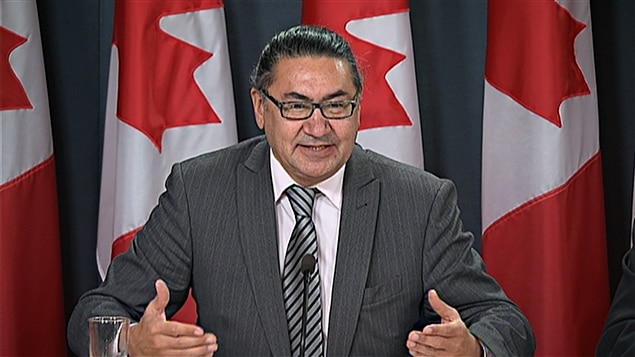L'appel erroné à l'histoire n'est pas le propre de Jason Kenney et de ses compères de la droite. Tantôt, c'est de la gauche que proviennent les bêtises, comme le rappelait une récente déclaration de Roméo Saganash, député sortant et candidat du Nouveau Parti démocratique dans Abitibi-Baie-James-Nunavik-Eeyou, l'énorme circonscription fédérale qui correspond à toute la moitié nord du Québec. Membre de la Première nation crie de Waswanipi, il a le grand mérite d'être l'un des rares élus autochtones au Parlement fédéral.
Saganash est l'un des trois candidats du NPD qui ont fait connaître, la semaine dernière, leur opposition à la position de leur parti sur le port du niqab. Un peu de contexte, pour ceux qui ne suivent pas trop les nouvelles : le niqab, ce voile intégral qui recouvre le visage à l'exception des yeux, suscite un vif malaise au Québec et risque de diviser l'électorat. Deux chefs de partis, Stephen Harper (Conservateurs) et Gilles Duceppe (Bloc Québécois), ont déclaré que son port lors du serment de citoyenneté va à l’encontre des valeurs canadiennes et québécoises et ont fait connaître leur volonté de l'interdire. Deux autres chefs, Thomas Mulcair (NPD) et Justin Trudeau (Libéraux), jugent pour leur part que toute mesure en ce sens serait une enfreinte à la liberté de religion. Passons le fond du débat -- plusieurs commentateurs ont déjà souligné avec perspicacité et éloquence qu'il s'agit d'un faux problème de société et que, par ailleurs, l'interdiction du niqab représenterait non pas la libération escomptée de femmes marginalisées, mais bien pour elle une oppression double. Attardons nous plutôt au lien ténu tiré entre le contexte actuel et celui de la Nouvelle-France.
Lors d'une conférence de presse tenue il y a deux semaines, Saganash expliquait son opposition au niqab : "Quand les premiers Français sont arrivés, ils ont su non seulement d’adapter, mais ils ont même adopté certains us et coutumes des amérindiens, des premiers colons, quand ils sont arrivés… c’est ça qu’il faut faire je pense à cet égard là. Je pense que mon parti ne serait pas d’accord là-dessus avec moi: le niqab est un vêtement d’oppresseur." En d'autres mots, les Français qui se sont installés au Canada ont adopté des usages autochtones, donc les immigrantes qui le font aujourd'hui devraient adopter les usages canadiens... dont celui de se montrer le visage.
L'idée sous-jacente n'est pas nouvelle. Comme disait Ambroise de Milan, si fueris Romae, Romano vivito more; si fueris alibi, vivito sicut ibi : à Rome, on fait comme chez les Romains. Sauf que l'invocation de la rencontre franco-autochtone témoigne d'une connaissance superficielle de l'histoire. Car l'adoption des "us et coutumes" autochtones par les colons français fut sélective et, somme toute, très minimale. Et cette adoption s'est faite volontairement, non pas sous l'effet de la contrainte. Elle fut additive, non pas soustractive. S'imaginer que Samuel de Champlain et Zunera Ishaq sont arrivés dans le même bateau, c'est rester aveugle aux réalités du passé et à celles du présent.
P.-F.-X.
 |
| Roméo Saganash. Photo: Radio-Canada. |
Lors d'une conférence de presse tenue il y a deux semaines, Saganash expliquait son opposition au niqab : "Quand les premiers Français sont arrivés, ils ont su non seulement d’adapter, mais ils ont même adopté certains us et coutumes des amérindiens, des premiers colons, quand ils sont arrivés… c’est ça qu’il faut faire je pense à cet égard là. Je pense que mon parti ne serait pas d’accord là-dessus avec moi: le niqab est un vêtement d’oppresseur." En d'autres mots, les Français qui se sont installés au Canada ont adopté des usages autochtones, donc les immigrantes qui le font aujourd'hui devraient adopter les usages canadiens... dont celui de se montrer le visage.
L'idée sous-jacente n'est pas nouvelle. Comme disait Ambroise de Milan, si fueris Romae, Romano vivito more; si fueris alibi, vivito sicut ibi : à Rome, on fait comme chez les Romains. Sauf que l'invocation de la rencontre franco-autochtone témoigne d'une connaissance superficielle de l'histoire. Car l'adoption des "us et coutumes" autochtones par les colons français fut sélective et, somme toute, très minimale. Et cette adoption s'est faite volontairement, non pas sous l'effet de la contrainte. Elle fut additive, non pas soustractive. S'imaginer que Samuel de Champlain et Zunera Ishaq sont arrivés dans le même bateau, c'est rester aveugle aux réalités du passé et à celles du présent.
P.-F.-X.